HOME | ABOUT US | MEDIA KIT | CONTACT US | INQUIRE
HOME | ABOUT US | MEDIA KIT | CONTACT US | INQUIRE
PUBLISHED DECEMBER 2024
The Kansas City region has long had a reputation for being one of the most philanthropic cities in America. But the giving goes far beyond what can be raised when individuals pass the hat.
On a corporate level, philanthropy takes many forms: Outright financial support for a litany of charitable causes and organizations, for sure. One really gets a sense of a community’s level of caring when you explore the creativity that goes into program design for corporate philanthropy here. That’s where human capital combines with hard cash to elevate an entire region.
Among the most popular—and effective—means of corporate philanthropy is the granting of paid time off to staff members who want to volunteer with non-profit missions close to their hearts. That can take a lot of forms, from a day or two here to an entire work week there—meaningful hours that allow employees to feel like they’re making contributions beyond the limits of a checkbook.
Other ways of giving include emphasis on applying workers’ talents to various causes, whether through direct volunteer work at fund-raisers, golf tournaments and charity balls, or through a strategic focus on non-profit board service, which not only assists charitable causes, it creates powerful networking opportunities that can strengthen businesses. There are matching-gift programs, in-kind contributions of professional services and products, incentive programs to engage clients and customers in the philanthropic mission—the possibilities are bounded only by a CEO’s and leader’s imagination.
When it comes to corporate giving, KC might not have the deepest wallet. But we’re pretty sure it has the biggest heart, and pound-for-pound, performs among the nation’s leaders, as this year’s Champions demonstrate.
Creative Planning
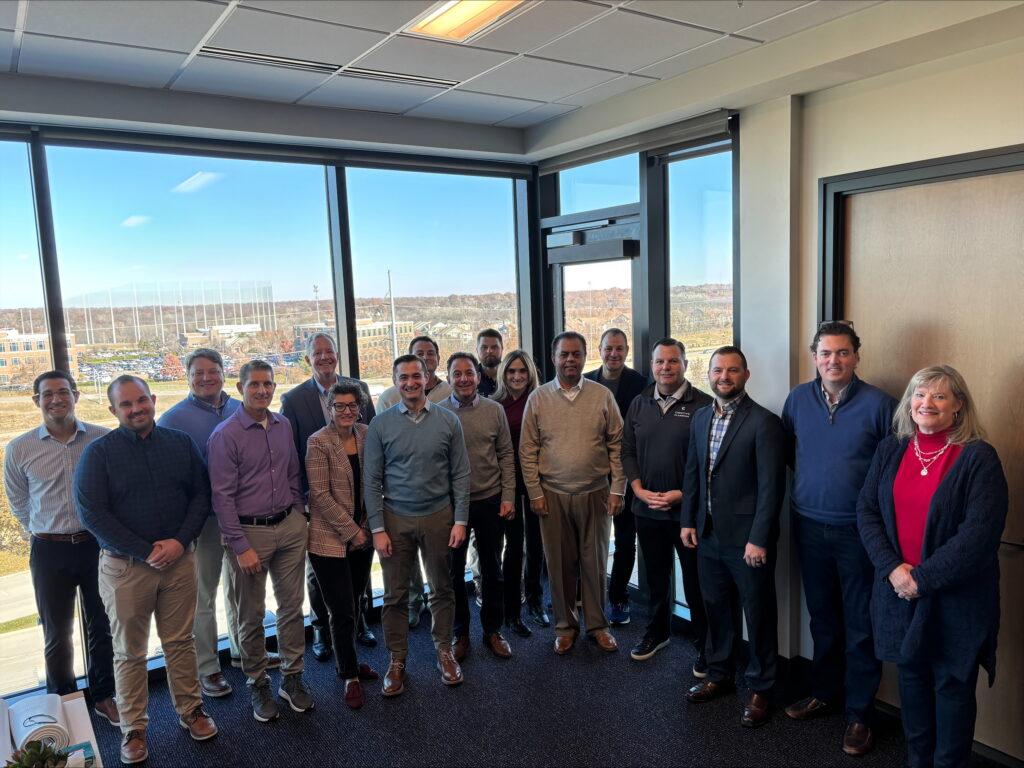 Overland Park wealth-management giant Creative Planning long ago established a baseline for corporate philanthropy. But what it can achieve today—with more than $325 billion in assets under management for clients in 90 nations—is light years from its days as a local boutique advisory with $100 million in AUM 20 years ago. “One of the benefits of our growth is it gives us so many additional ways to give back to the community,” says CEO Peter Mallouk. “All our teams have community-service days, and firm-wide we have several days a year we all get together to support causes. More people has meant more impact.” Thus, the Creative Planning Foundation has also scaled along with the company, he says, with the amount of money granted to across the country quadrupling in recent years. “I think the spirit of giving that permeates our culture is a factor that attracts a certain type of person that we want to have in our company, so it is a win-win in many ways,” Mallouk says. The firm’s philanthropic program targets impactful community support with financial education, food security and strategic partnerships. Pathway Financial Education, for example, is the three-year-old flagship initiative to spread vital financial literacy programs to under-resourced communities. In addition to hands-on volunteer activities with team members, members of the firm provided $1.34 million to non-profits, with many donations driven by clients’ input and requests. Giving on that scale requires some customization as the firm enters new markets, and Mallouk says that in each one, “we have a leader that works with their team to replicate our Kansas City approach of giving days where our team supports a charity and financial grants.” But in all cases, the firm is striving for impact. “With our major gifts, we are very targeted, clear with the impact we want to have, and stay in communication with the charities,” Mallouk says. “We have 500 partners, and it is important that the giving make sense for the communities we operate in and for Creative Planning’s culture. We are also a for-profit business, so the giving has inherent limitations.” Among the most significant efforts he says, came at the onset of the 2020 pandemic, when the firm donated $500,000 to provide meals to children displaced by school closings. “We had made that gift the day school closings were announced, and it was in effect within two days,” Mallouk says. “It was great to be in a position to impact the community in a concrete way very quickly. For the most part, we look to spread our gifts across many causes, and support all we can that impacts the Greater Kansas City area.”
Overland Park wealth-management giant Creative Planning long ago established a baseline for corporate philanthropy. But what it can achieve today—with more than $325 billion in assets under management for clients in 90 nations—is light years from its days as a local boutique advisory with $100 million in AUM 20 years ago. “One of the benefits of our growth is it gives us so many additional ways to give back to the community,” says CEO Peter Mallouk. “All our teams have community-service days, and firm-wide we have several days a year we all get together to support causes. More people has meant more impact.” Thus, the Creative Planning Foundation has also scaled along with the company, he says, with the amount of money granted to across the country quadrupling in recent years. “I think the spirit of giving that permeates our culture is a factor that attracts a certain type of person that we want to have in our company, so it is a win-win in many ways,” Mallouk says. The firm’s philanthropic program targets impactful community support with financial education, food security and strategic partnerships. Pathway Financial Education, for example, is the three-year-old flagship initiative to spread vital financial literacy programs to under-resourced communities. In addition to hands-on volunteer activities with team members, members of the firm provided $1.34 million to non-profits, with many donations driven by clients’ input and requests. Giving on that scale requires some customization as the firm enters new markets, and Mallouk says that in each one, “we have a leader that works with their team to replicate our Kansas City approach of giving days where our team supports a charity and financial grants.” But in all cases, the firm is striving for impact. “With our major gifts, we are very targeted, clear with the impact we want to have, and stay in communication with the charities,” Mallouk says. “We have 500 partners, and it is important that the giving make sense for the communities we operate in and for Creative Planning’s culture. We are also a for-profit business, so the giving has inherent limitations.” Among the most significant efforts he says, came at the onset of the 2020 pandemic, when the firm donated $500,000 to provide meals to children displaced by school closings. “We had made that gift the day school closings were announced, and it was in effect within two days,” Mallouk says. “It was great to be in a position to impact the community in a concrete way very quickly. For the most part, we look to spread our gifts across many causes, and support all we can that impacts the Greater Kansas City area.”
HCA Midwest Health
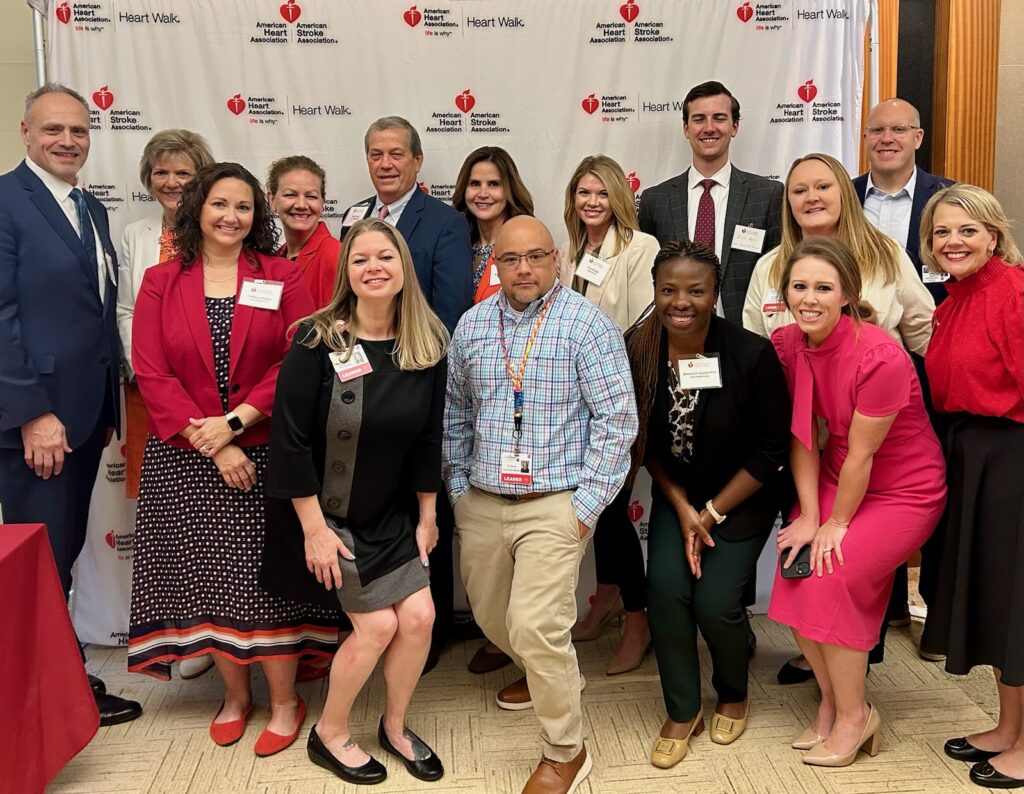 Even if one were to consider uncompensated care simply “the cost of doing business” for a hospital system, HCA Midwest Health has a philanthropic footprint that goes far beyond nearly $100 million in uncompensated and charity care each year. Those efforts are both broad and deep: Large-scale donations like the $100,000-plus that staffers raised to educated students about CPR and health-care robotics. A company-wide Week of Service that yielded more than 4,000 volunteer hours for area organizations. Sorting, packing and labeling boxes of medical supplies and equipment donated to organizations abroad. “There is no shortage of need or number of worthy organizations,” says CEO Keith Zimmerman. “However, HCA Midwest Health has the advantage of leveraging the scale of HCA Healthcare (the national parent) to focus on key impact areas across the nation to make a more meaningful impact. That is then paired with our colleagues’ personal interests and passions, which we also support.” Those efforts support five broad goals here: Increasing opportunity and access to health-care careers; championing positive mental wellness; ensuring all moms and babies have a strong, healthy start; advocating and promoting heart health for all communities; and improving access to cancer care for all communities. In that way, the region’s biggest private-sector employer is going far beyond direct patient care, and doing it in a diverse set of communities both urban and suburban. “We leverage the data and empirical evidence collected throughout the communities HCA Healthcare serves to determine what initiatives will improve lives, and we support with dollars and action,” Zimmerman says. “We deploy our efforts across the country and focus on areas of greatest need.” One example: The Kansas City operation also sent more than 40 employees to support their HCA colleagues impacted during Hurricane Helene and Milton this summer. In addition to that good corporate citizenship, Zimmerman notes that, “as the region’s only tax-paying health system, HCA Midwest Health paid nearly $193 million in federal, state and local taxes in 2022.” With such a broad potential reach, the goal of maximizing impact requires constant fine-tuning. That’s the way organizations like Kansas City’s Kanbe’s Markets and the Food Equality Initiative in Olathe ended up on the company radar, securing donations of $100,000 each.
Even if one were to consider uncompensated care simply “the cost of doing business” for a hospital system, HCA Midwest Health has a philanthropic footprint that goes far beyond nearly $100 million in uncompensated and charity care each year. Those efforts are both broad and deep: Large-scale donations like the $100,000-plus that staffers raised to educated students about CPR and health-care robotics. A company-wide Week of Service that yielded more than 4,000 volunteer hours for area organizations. Sorting, packing and labeling boxes of medical supplies and equipment donated to organizations abroad. “There is no shortage of need or number of worthy organizations,” says CEO Keith Zimmerman. “However, HCA Midwest Health has the advantage of leveraging the scale of HCA Healthcare (the national parent) to focus on key impact areas across the nation to make a more meaningful impact. That is then paired with our colleagues’ personal interests and passions, which we also support.” Those efforts support five broad goals here: Increasing opportunity and access to health-care careers; championing positive mental wellness; ensuring all moms and babies have a strong, healthy start; advocating and promoting heart health for all communities; and improving access to cancer care for all communities. In that way, the region’s biggest private-sector employer is going far beyond direct patient care, and doing it in a diverse set of communities both urban and suburban. “We leverage the data and empirical evidence collected throughout the communities HCA Healthcare serves to determine what initiatives will improve lives, and we support with dollars and action,” Zimmerman says. “We deploy our efforts across the country and focus on areas of greatest need.” One example: The Kansas City operation also sent more than 40 employees to support their HCA colleagues impacted during Hurricane Helene and Milton this summer. In addition to that good corporate citizenship, Zimmerman notes that, “as the region’s only tax-paying health system, HCA Midwest Health paid nearly $193 million in federal, state and local taxes in 2022.” With such a broad potential reach, the goal of maximizing impact requires constant fine-tuning. That’s the way organizations like Kansas City’s Kanbe’s Markets and the Food Equality Initiative in Olathe ended up on the company radar, securing donations of $100,000 each.
Hunt Midwest
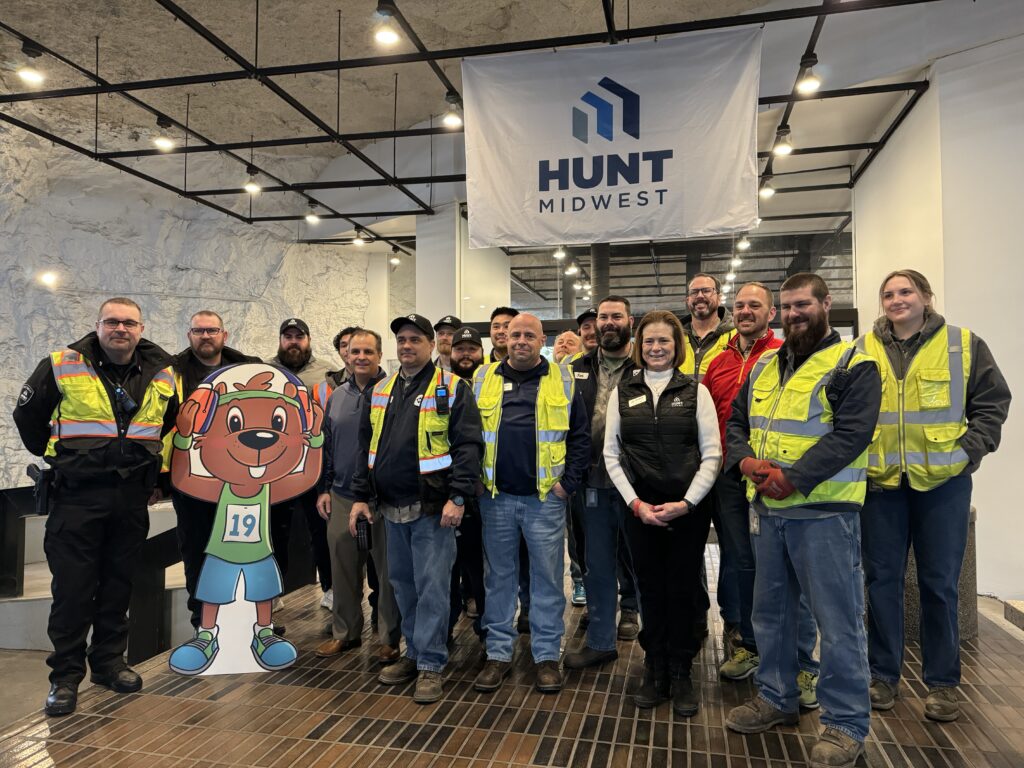 Nearly a generation after he left us, the legacy of Lamar Hunt lives on—and not just on the football field. A far more meaningful impact is coming from Hunt Midwest. “Giving back is built into the very fabric of Hunt Midwest, going all the way back to Lamar Hunt’s arrival in KC and creation of the Kansas City Chiefs in 1963,” says CEO Ora Reynolds. “He was so grateful that the community embraced the team with open arms that he decided he would reinvest much of his success right here in his adopted hometown. … And he made philanthropic giving a cornerstone of how Hunt Midwest would share its success with the entire community.” Perhaps the most visible demonstration of that comes each February, with the famed Groundhog Run through the underground caverns at Subtropolis. The 5-k and 10-k runs have contributed nearly $5 million since 1982 to benefit the Ability KC. That’s just for starters. Hunt Midwest employees, in combination with corporate matching funds, have contributed over $1,961,000 to United Way of Greater Kansas City since 1987. Financial support also goes to other non-profits and charities, including the Greater Kansas City Community Foundation, Catholic Charities of Kansas City-St. Joseph and Harvesters; and health-focused entities including the American Heart Association, JDRF, the National Multiple Sclerosis Society, Leukemia and Lymphoma Society, the University of Kansas Medical Center and AdventHealth Shawnee Mission. Support for the arts goes to Starlight Theatre, the Kauffman Center for the Performing Arts, the Nelson-Atkins Museum of Art, and National World War I Museum and Memorial. Civic causes, too, are supported, including the Chiefs Children’s Charity Fund, Northland Neighborhoods, Union Station, UMKC’s Bloch School of Management, and the Liberty, Park Hill, Platte County and North Kansas City K-12 school districts. Still, the company is constantly looking to expand its philanthropy, Reynolds says: “Yes, in some cases that means using our resources to make a financial commitment. But more often it means leveraging our reputation and relationships to bring our expertise to bear on a community need or to simply roll up our sleeves to volunteer alongside those working in the field. Galas and oversized cardboard checks are fun and worthwhile, but there’s nothing more impactful for both nonprofits and our staff than hands-on volunteer work—like reading with young students through Lead to Read or helping Project C.U.R.E. sort medical supplies to ship from their SubTropolis warehouse to people in need across the globe.”
Nearly a generation after he left us, the legacy of Lamar Hunt lives on—and not just on the football field. A far more meaningful impact is coming from Hunt Midwest. “Giving back is built into the very fabric of Hunt Midwest, going all the way back to Lamar Hunt’s arrival in KC and creation of the Kansas City Chiefs in 1963,” says CEO Ora Reynolds. “He was so grateful that the community embraced the team with open arms that he decided he would reinvest much of his success right here in his adopted hometown. … And he made philanthropic giving a cornerstone of how Hunt Midwest would share its success with the entire community.” Perhaps the most visible demonstration of that comes each February, with the famed Groundhog Run through the underground caverns at Subtropolis. The 5-k and 10-k runs have contributed nearly $5 million since 1982 to benefit the Ability KC. That’s just for starters. Hunt Midwest employees, in combination with corporate matching funds, have contributed over $1,961,000 to United Way of Greater Kansas City since 1987. Financial support also goes to other non-profits and charities, including the Greater Kansas City Community Foundation, Catholic Charities of Kansas City-St. Joseph and Harvesters; and health-focused entities including the American Heart Association, JDRF, the National Multiple Sclerosis Society, Leukemia and Lymphoma Society, the University of Kansas Medical Center and AdventHealth Shawnee Mission. Support for the arts goes to Starlight Theatre, the Kauffman Center for the Performing Arts, the Nelson-Atkins Museum of Art, and National World War I Museum and Memorial. Civic causes, too, are supported, including the Chiefs Children’s Charity Fund, Northland Neighborhoods, Union Station, UMKC’s Bloch School of Management, and the Liberty, Park Hill, Platte County and North Kansas City K-12 school districts. Still, the company is constantly looking to expand its philanthropy, Reynolds says: “Yes, in some cases that means using our resources to make a financial commitment. But more often it means leveraging our reputation and relationships to bring our expertise to bear on a community need or to simply roll up our sleeves to volunteer alongside those working in the field. Galas and oversized cardboard checks are fun and worthwhile, but there’s nothing more impactful for both nonprofits and our staff than hands-on volunteer work—like reading with young students through Lead to Read or helping Project C.U.R.E. sort medical supplies to ship from their SubTropolis warehouse to people in need across the globe.”
KPMG
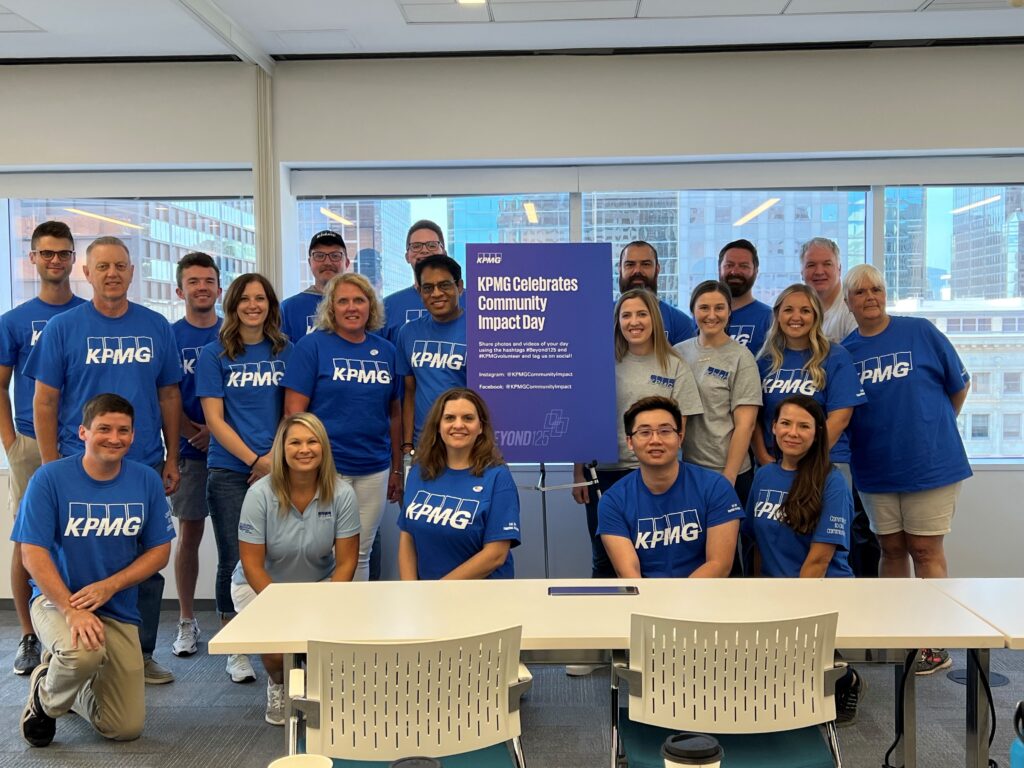 Think Globally/Act Locally isn’t just a bumper sticker: At KPMG, it’s a way of life that defines a good corporate citizen. “While our firm champions many great causes nationally, we believe that relationships and giving back are largely local,” says Stephen Penn, Kansas City office manager for a global accounting and consulting firm with nearly 275,000 employees. “Each of my fellow 50 partners and managing directors in Kansas City are involved in local organizations that are important to them personally. We’ve had the great privilege of partnering and working with many great local organizations and causes—whether it’s giving a hand-up to our neighbors in need; supporting Kansas City’s civic, business, and economic advancement; promoting women and diversity in the workplace; boosting the arts; or supporting our city’s hosting of the NFL Draft and the vision behind our new airport terminal—we are very intentional about supporting our hometown.” One of the most impressive stats demonstrating that commitment: “All our partners have been recognized as United Way Tocqueville Society members for a number of years,” Penn says of a group whose individual members have contributed at least $10,000 to the organization. Further, he says, “our leaders have always stressed the importance of involvement with civic and community boards.” That’s a win-win, because professionals who care about the communities and people they serve, he says, are disproportionately represented within the firm’s leadership ranks. “When you start there, what follows is usually pretty good,” Penn says. The organic nature of care demonstrated by that is also a source of pride. “Our office is regularly a top office in our firm in our people’s community participation,” Penn says. “And while we certainly encourage our folks to get involved in civic and charitable activities, most of our giving back starts with our people: they come and ask for support, they challenge us to do more, they take charge and get others involved.” Various charitable events in town, he says, blossomed from ideas presented by staff members here. “They took their idea and ran with it,” Penn says. “It says a lot about the people that work here: Giving back is not something we do in our free time—it’s who we are. KPMG has a legacy of giving back to our community, and I’m blessed to be the current steward of that rich tradition. It’s one of our firm’s core values—and we take pride in our involvement.”
Think Globally/Act Locally isn’t just a bumper sticker: At KPMG, it’s a way of life that defines a good corporate citizen. “While our firm champions many great causes nationally, we believe that relationships and giving back are largely local,” says Stephen Penn, Kansas City office manager for a global accounting and consulting firm with nearly 275,000 employees. “Each of my fellow 50 partners and managing directors in Kansas City are involved in local organizations that are important to them personally. We’ve had the great privilege of partnering and working with many great local organizations and causes—whether it’s giving a hand-up to our neighbors in need; supporting Kansas City’s civic, business, and economic advancement; promoting women and diversity in the workplace; boosting the arts; or supporting our city’s hosting of the NFL Draft and the vision behind our new airport terminal—we are very intentional about supporting our hometown.” One of the most impressive stats demonstrating that commitment: “All our partners have been recognized as United Way Tocqueville Society members for a number of years,” Penn says of a group whose individual members have contributed at least $10,000 to the organization. Further, he says, “our leaders have always stressed the importance of involvement with civic and community boards.” That’s a win-win, because professionals who care about the communities and people they serve, he says, are disproportionately represented within the firm’s leadership ranks. “When you start there, what follows is usually pretty good,” Penn says. The organic nature of care demonstrated by that is also a source of pride. “Our office is regularly a top office in our firm in our people’s community participation,” Penn says. “And while we certainly encourage our folks to get involved in civic and charitable activities, most of our giving back starts with our people: they come and ask for support, they challenge us to do more, they take charge and get others involved.” Various charitable events in town, he says, blossomed from ideas presented by staff members here. “They took their idea and ran with it,” Penn says. “It says a lot about the people that work here: Giving back is not something we do in our free time—it’s who we are. KPMG has a legacy of giving back to our community, and I’m blessed to be the current steward of that rich tradition. It’s one of our firm’s core values—and we take pride in our involvement.”
Mariner
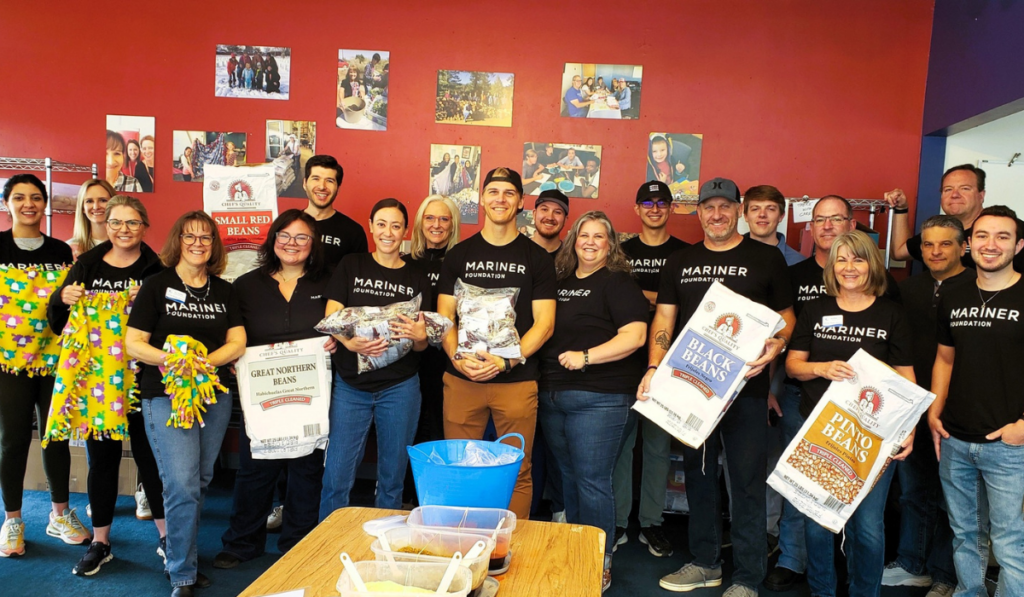 This past year has produced a milestone for Mariner, the Overland Park wealth-management firm: Its proven path to growth has propelled it over the threshold of $100 billion in assets under management, one of only five in that space across the region. For a firm that began with a strong commitment to philanthropy, growth implies change there, too, as its national footprint has expanded to 124 locations. “We have a culture of continuous improvement at Mariner, so we are always assessing where we can evolve our processes,” says Cassie Bicknell, community impact manager. “While we have top-down leadership initiatives to drive our charitable efforts, most of our efforts are driven by our associates.” That, she says, produces natural adjustments. “As Mariner continues to grow, it is important our culture of giving remains a key component,” says Katrina Radenberg, chief investment officer. “As found at any fast-growing company, communication is our biggest challenge to ensuring our associates are staying up to date on all philanthropic efforts. We have spent a lot of time over the past year improving our communication strategy.Fortunately, we have a strong leadership team that not only advocates for our philanthropic efforts, but also gets involved in the community and leads by example.” Bicknell says a key to cultural success is engagement. “All associates have an opportunity to participate in contributing to their community in a way that is meaningful and accessible,” she says. “The Mariner Foundation creates an opportunity for our associates to support each other’s philanthropic passions and be a part of helping over 400 organizations and thousands of individuals in need annually.” Mariner also offers two days of paid time off for our associates to work closely with those charitable organizations most dear to them. Mariner also draws on corporate giving services provided by the Greater Kansas City Community Foundation to enhance its philanthropy, which largely focuses on “improving lives by educating, bridging, and equipping individuals and organizations with tools and opportunities.” The foundation has awarded more than $7.5 million in grants to at least 1,000 organizations, and this year alone, has donated more than $1.4 million to 350-plus organizations. Associates are encouraged to submit grant recommendations to the foundation’s board and take part in another new initiative, +Impact Day, in which nearly 800 associates nationwide volunteered more than 2,100 hours of service on a single day, partnering with 71 organizations and awarding $170,500 in grants.
This past year has produced a milestone for Mariner, the Overland Park wealth-management firm: Its proven path to growth has propelled it over the threshold of $100 billion in assets under management, one of only five in that space across the region. For a firm that began with a strong commitment to philanthropy, growth implies change there, too, as its national footprint has expanded to 124 locations. “We have a culture of continuous improvement at Mariner, so we are always assessing where we can evolve our processes,” says Cassie Bicknell, community impact manager. “While we have top-down leadership initiatives to drive our charitable efforts, most of our efforts are driven by our associates.” That, she says, produces natural adjustments. “As Mariner continues to grow, it is important our culture of giving remains a key component,” says Katrina Radenberg, chief investment officer. “As found at any fast-growing company, communication is our biggest challenge to ensuring our associates are staying up to date on all philanthropic efforts. We have spent a lot of time over the past year improving our communication strategy.Fortunately, we have a strong leadership team that not only advocates for our philanthropic efforts, but also gets involved in the community and leads by example.” Bicknell says a key to cultural success is engagement. “All associates have an opportunity to participate in contributing to their community in a way that is meaningful and accessible,” she says. “The Mariner Foundation creates an opportunity for our associates to support each other’s philanthropic passions and be a part of helping over 400 organizations and thousands of individuals in need annually.” Mariner also offers two days of paid time off for our associates to work closely with those charitable organizations most dear to them. Mariner also draws on corporate giving services provided by the Greater Kansas City Community Foundation to enhance its philanthropy, which largely focuses on “improving lives by educating, bridging, and equipping individuals and organizations with tools and opportunities.” The foundation has awarded more than $7.5 million in grants to at least 1,000 organizations, and this year alone, has donated more than $1.4 million to 350-plus organizations. Associates are encouraged to submit grant recommendations to the foundation’s board and take part in another new initiative, +Impact Day, in which nearly 800 associates nationwide volunteered more than 2,100 hours of service on a single day, partnering with 71 organizations and awarding $170,500 in grants.
McCownGordon Construction
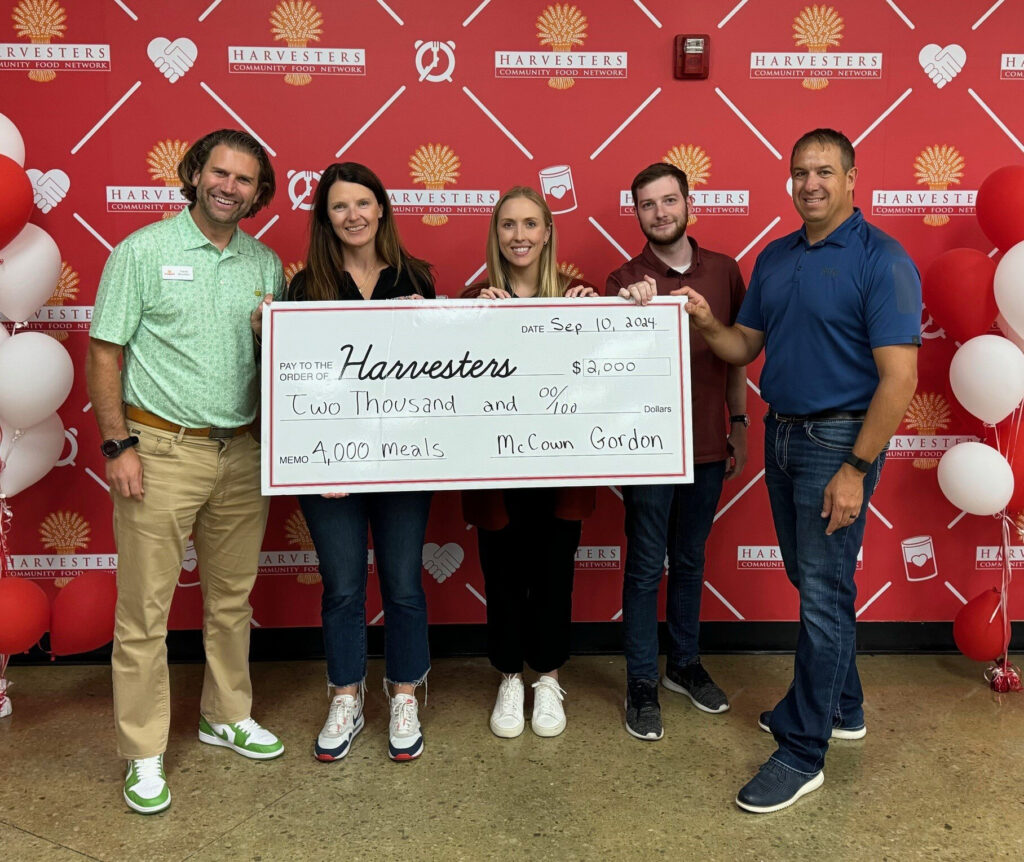 A foundational corporate pledge to donate 10 percent of profits to charitable and non-profit organizations is a rare quality in a company. But the giving doesn’t stop there for McCownGordon Construction. In the quarter-century since it’s founding, it has established a broad philanthropic strategy that supports organizations like Children’s Mercy and Ronald McDonald House Charities, educational foundations for local K-12 school districts, urban community colleges, Big Brothers Big Sisters and many others. And not that its operations have expanded beyond the metro area, that same impact is being made in Wichita, Manhattan and the Dallas-Fort Worth region. As it steadily pushes toward the $1 billion mark in revenues, says CEO Ramin Cherafat, “growth has enabled McCownGordon to implement more structured and strategic processes for determining where philanthropic efforts should be directed. By leveraging data and insights, we can identify the most impactful opportunities and allocate resources more effectively. This approach ensures that the company’s philanthropic contributions are aligned without mission and values, ultimately maximizing the positive impact on the communities we serve.” As a leader, he says, to have inherited a broad philanthropic approach from the founders. “I found it incredibly beneficial to step into a leadership role with a philanthropic mission already established by Pat (McCown) and Brett (Gordon). This foundation provided a strong starting point, allowing the company to build upon existing initiatives and further expand our philanthropic efforts.” So beyond cutting checks and sponsoring events, community engagement is at the core of the company culture. The list of talent beneficiaries includes the Nelson Atkins Museum (Cherafat is also on the museum board as well as that of UMKC), while others work on behalf of Starlight Theatre, the Kansas City Symphony and the American Heart Association’s Go Red for Women event. Other leadership team members serve on boards ranging from Goodwill, The Central Exchange and University Health, the Juvenile Diabetes Research Foundation and AdventHealth Foundation, among many others. Employees have donated thousands of hours to local causes, and Business Resource Groups there have funneled thousands in sponsorships to a wide range of other prominent charities.
A foundational corporate pledge to donate 10 percent of profits to charitable and non-profit organizations is a rare quality in a company. But the giving doesn’t stop there for McCownGordon Construction. In the quarter-century since it’s founding, it has established a broad philanthropic strategy that supports organizations like Children’s Mercy and Ronald McDonald House Charities, educational foundations for local K-12 school districts, urban community colleges, Big Brothers Big Sisters and many others. And not that its operations have expanded beyond the metro area, that same impact is being made in Wichita, Manhattan and the Dallas-Fort Worth region. As it steadily pushes toward the $1 billion mark in revenues, says CEO Ramin Cherafat, “growth has enabled McCownGordon to implement more structured and strategic processes for determining where philanthropic efforts should be directed. By leveraging data and insights, we can identify the most impactful opportunities and allocate resources more effectively. This approach ensures that the company’s philanthropic contributions are aligned without mission and values, ultimately maximizing the positive impact on the communities we serve.” As a leader, he says, to have inherited a broad philanthropic approach from the founders. “I found it incredibly beneficial to step into a leadership role with a philanthropic mission already established by Pat (McCown) and Brett (Gordon). This foundation provided a strong starting point, allowing the company to build upon existing initiatives and further expand our philanthropic efforts.” So beyond cutting checks and sponsoring events, community engagement is at the core of the company culture. The list of talent beneficiaries includes the Nelson Atkins Museum (Cherafat is also on the museum board as well as that of UMKC), while others work on behalf of Starlight Theatre, the Kansas City Symphony and the American Heart Association’s Go Red for Women event. Other leadership team members serve on boards ranging from Goodwill, The Central Exchange and University Health, the Juvenile Diabetes Research Foundation and AdventHealth Foundation, among many others. Employees have donated thousands of hours to local causes, and Business Resource Groups there have funneled thousands in sponsorships to a wide range of other prominent charities.
UMB Bank
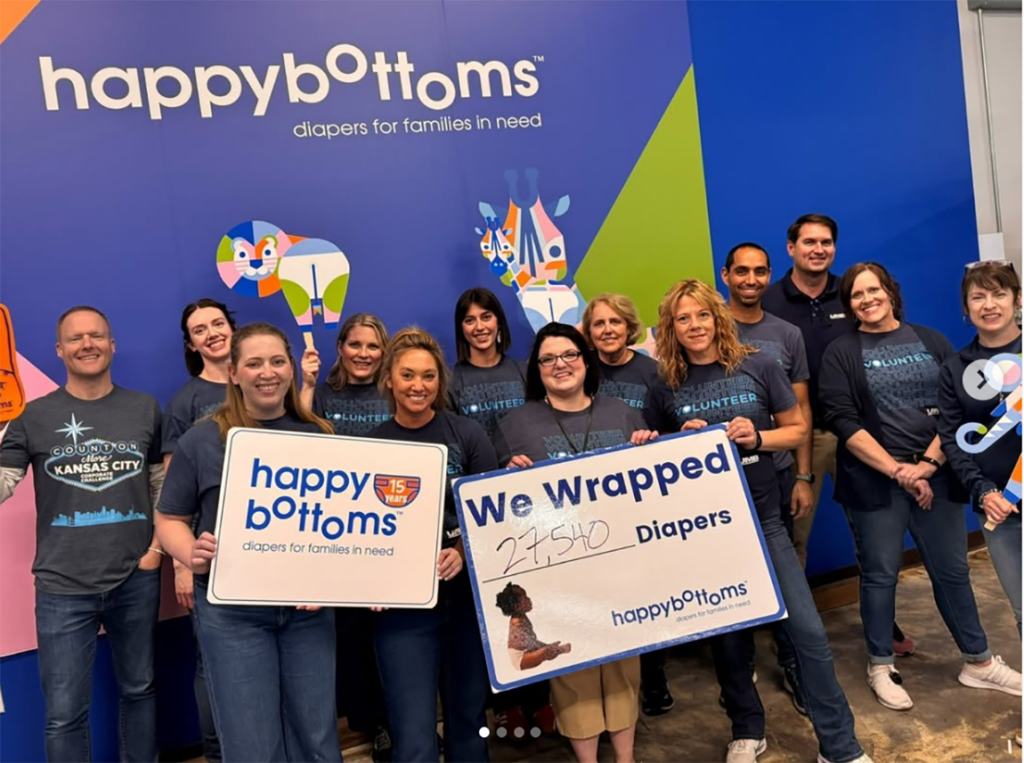 What sets UMB apart as a good corporate citizen isn’t its 111-year history of giving back to the communities it serves, though that’s a rare achievement in itself. On top of that is one of the broadest visions of corporate philanthropy one might find in Kansas City. Certainly, it’s part of the company’s culture to donate to and volunteer with organizations that associates care about, in the communities where they live and work. But look at the depth and breadth of that commitment: Efforts that tackle the thorny issue of affordable housing. Promoting financial literacy. Supporting interactive learning for children. Support for small businesses that goes beyond merely making loans. Robust efforts to promote equal opportunities in board representation, in construction jobs, in the hospitality sector and across its home sector, financial services. “UMB encourages all employees to get involved and support the causes and organizations they are passionate about through volunteer time off and matching-gift programs,” says Mariner Kemper, chairman and CEO of UMB Financial Corp. Last year, he notes, nearly 700 associates logged 7,680 volunteer hours by serving more than 300 local organizations. “When a UMB associate makes an eligible financial contribution to a qualified non-profit organization,” he says, “UMB will match it dollar-for-dollar up to $250 annually, per associate.” Nearly 1,100 associates participated in the Matching Gift Program last year, and the bank’s company-wide workplace giving campaign allows associates to support qualified non-profits of their choice with recurring payroll deductions—an impact of more than $470,000 last year. “Combined with matching-gift funds of more than $179,000, UMB associate giving totaled nearly $649,000 for the year,” Kemper says. He believes that the strength of UMB shines through efforts to help families, diverse communities, institutions, and businesses of all sizes, which include services like down-payment assistance for home buyers and support of local entrepreneurs. “More than ever,” Kemper says, “regional financial institutions are critical elements to local economies and have become increasingly important in supporting community growth and stability.”
What sets UMB apart as a good corporate citizen isn’t its 111-year history of giving back to the communities it serves, though that’s a rare achievement in itself. On top of that is one of the broadest visions of corporate philanthropy one might find in Kansas City. Certainly, it’s part of the company’s culture to donate to and volunteer with organizations that associates care about, in the communities where they live and work. But look at the depth and breadth of that commitment: Efforts that tackle the thorny issue of affordable housing. Promoting financial literacy. Supporting interactive learning for children. Support for small businesses that goes beyond merely making loans. Robust efforts to promote equal opportunities in board representation, in construction jobs, in the hospitality sector and across its home sector, financial services. “UMB encourages all employees to get involved and support the causes and organizations they are passionate about through volunteer time off and matching-gift programs,” says Mariner Kemper, chairman and CEO of UMB Financial Corp. Last year, he notes, nearly 700 associates logged 7,680 volunteer hours by serving more than 300 local organizations. “When a UMB associate makes an eligible financial contribution to a qualified non-profit organization,” he says, “UMB will match it dollar-for-dollar up to $250 annually, per associate.” Nearly 1,100 associates participated in the Matching Gift Program last year, and the bank’s company-wide workplace giving campaign allows associates to support qualified non-profits of their choice with recurring payroll deductions—an impact of more than $470,000 last year. “Combined with matching-gift funds of more than $179,000, UMB associate giving totaled nearly $649,000 for the year,” Kemper says. He believes that the strength of UMB shines through efforts to help families, diverse communities, institutions, and businesses of all sizes, which include services like down-payment assistance for home buyers and support of local entrepreneurs. “More than ever,” Kemper says, “regional financial institutions are critical elements to local economies and have become increasingly important in supporting community growth and stability.”